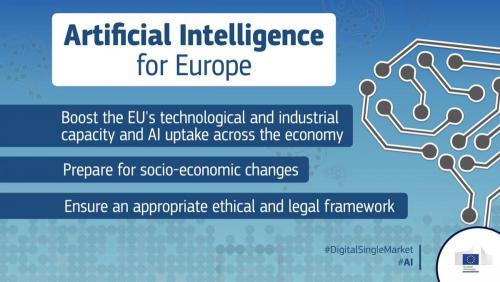
https://ec.europa.eu/commission/news/artificial-intelligence-2019-apr-08_en
The Commission presented today next steps for building trust in artificial intelligence by taking forward the work of the High-Level Expert Group.
Building on the work of the group of independent experts appointed in June 2018, the Commission launched a pilot phase to ensure that the ethical guidelines for Artificial Intelligence (AI) development and use can be implemented in practice. The Commission invites industry, research institutes and public authorities to test the detailed assessment list drafted by the High-Level Expert Group, which complements the guidelines.
Today's plans are a deliverable under the AI strategy of April 2018, which aims at increasing public and private investments to at least €20 billion annually over the next decade, making more data available, fostering talent and ensuring trust.
Artificial Intelligence can benefit a wide-range of sectors, such as healthcare, energy consumption, cars safety, farming, climate change and financial risk management. Artificial Intelligence can also help to detect fraud and cybersecurity threats, and enables law enforcement authorities to fight crime more efficiently. However, Artificial Intelligence also brings new challenges for the future of work, and raises legal and ethical questions.
The Commission is taking a three-step approach: setting-out the key requirements for trustworthy Artificial Intelligence, launching a large scale pilot phase for feedback from stakeholders, and working on international consensus building for human-centric Artificial Intelligence.
1. Seven essentials for achieving trustworthy Artificial Intelligence
Trustworthy Artificial Intelligence should respect all applicable laws and regulations, as well as a series of requirements; specific assessment lists aim to help verify the application of each of the key requirements:
- Human agency and oversight: Artificial Intelligence systems should enable equitable societies by supporting human agency and fundamental rights, and not decrease, limit or misguide human autonomy.
- Robustness and safety: Trustworthy Artificial Intelligence requires algorithms to be secure, reliable and robust enough to deal with errors or inconsistencies during all life cycle phases of Artificial Intelligence systems.
- Privacy and data governance: Citizens should have full control over their own data, while data concerning them will not be used to harm or discriminate against them.
- Transparency: The traceability of Artificial Intelligence systems should be ensured.
- Diversity, non-discrimination and fairness: Artificial Intelligence systems should consider the whole range of human abilities, skills and requirements, and ensure accessibility.
- Societal and environmental well-being: Artificial Intelligence systems should be used to enhance positive social change and enhance sustainability and ecological responsibility.
- Accountability: Mechanisms should be put in place to ensure responsibility and accountability for Artificial Intelligence systems and their outcomes.
2. Large-scale pilot with partners
In summer 2019, the Commission will launch a pilot phase involving a wide range of stakeholders. Already today, companies, public administrations and organisations can sign up to the European AI Alliance and receive a notification when the pilot starts. In addition, members of the Artificial Intelligence high-level expert group will help present and explain the guidelines to relevant stakeholders in Member States.
3. Building international consensus for human-centric Artificial Intelligence
The Commission wants to bring this approach to Artificial Intelligence ethics to the global stage because technologies, data and algorithms know no borders. To this end, the Commission will strengthen cooperation with like-minded partners such as Japan, Canada or Singapore and continue to play an active role in international discussions and initiatives including the G7 and G20. The pilot phase will also involve companies from other countries and international organisations.










Add new comment